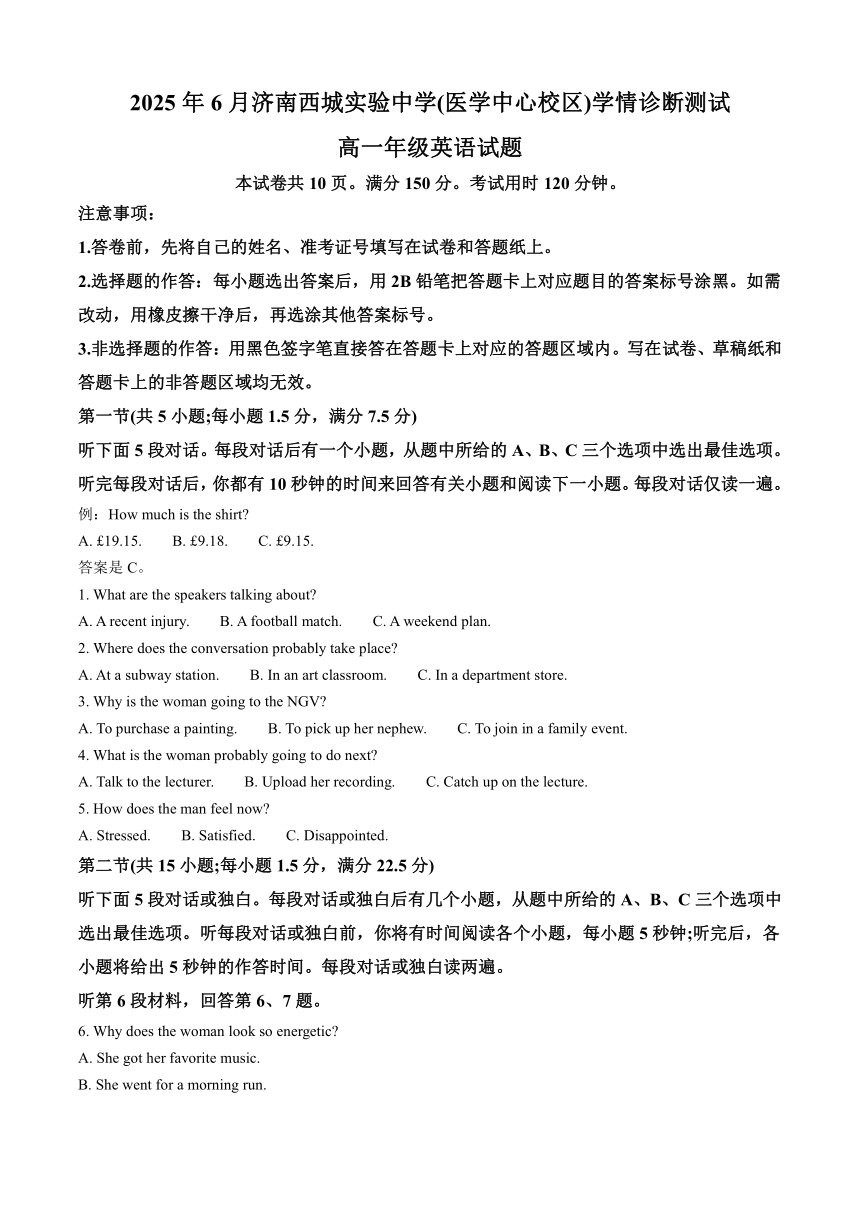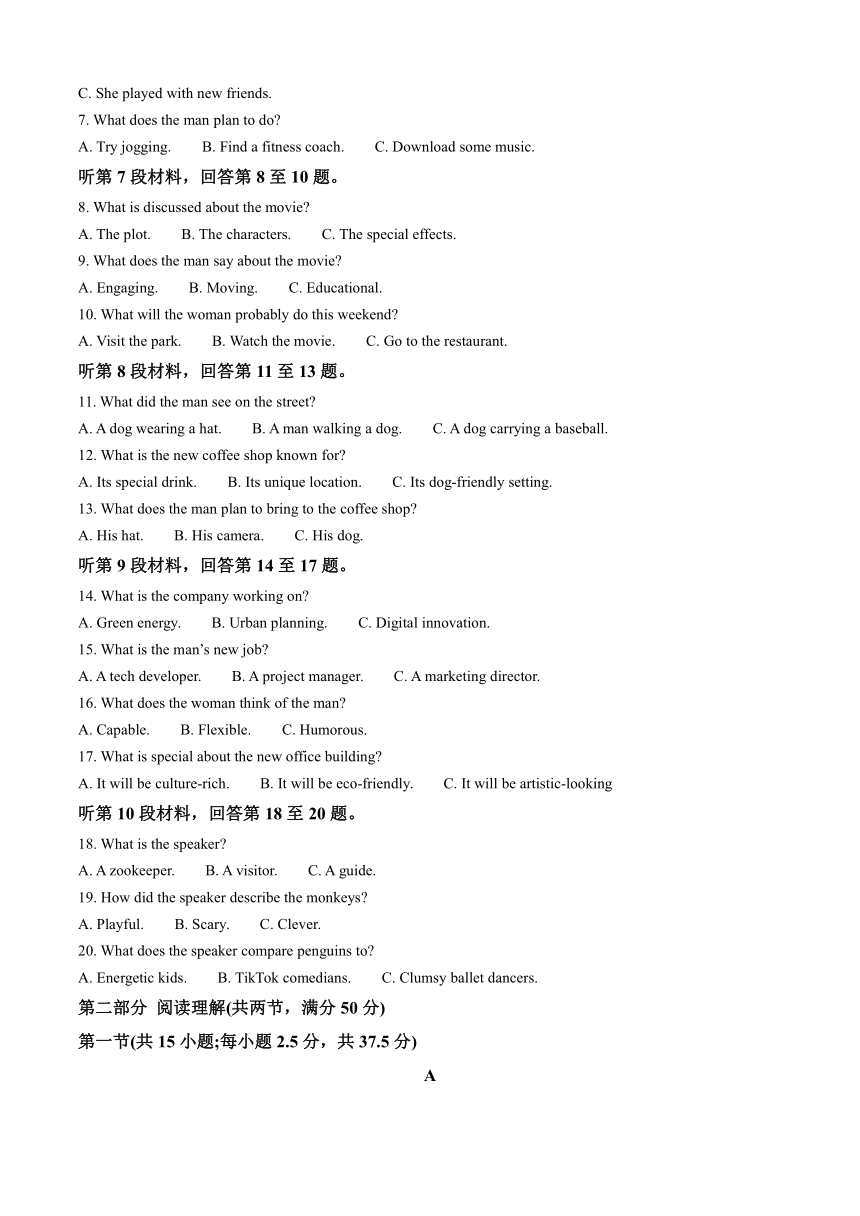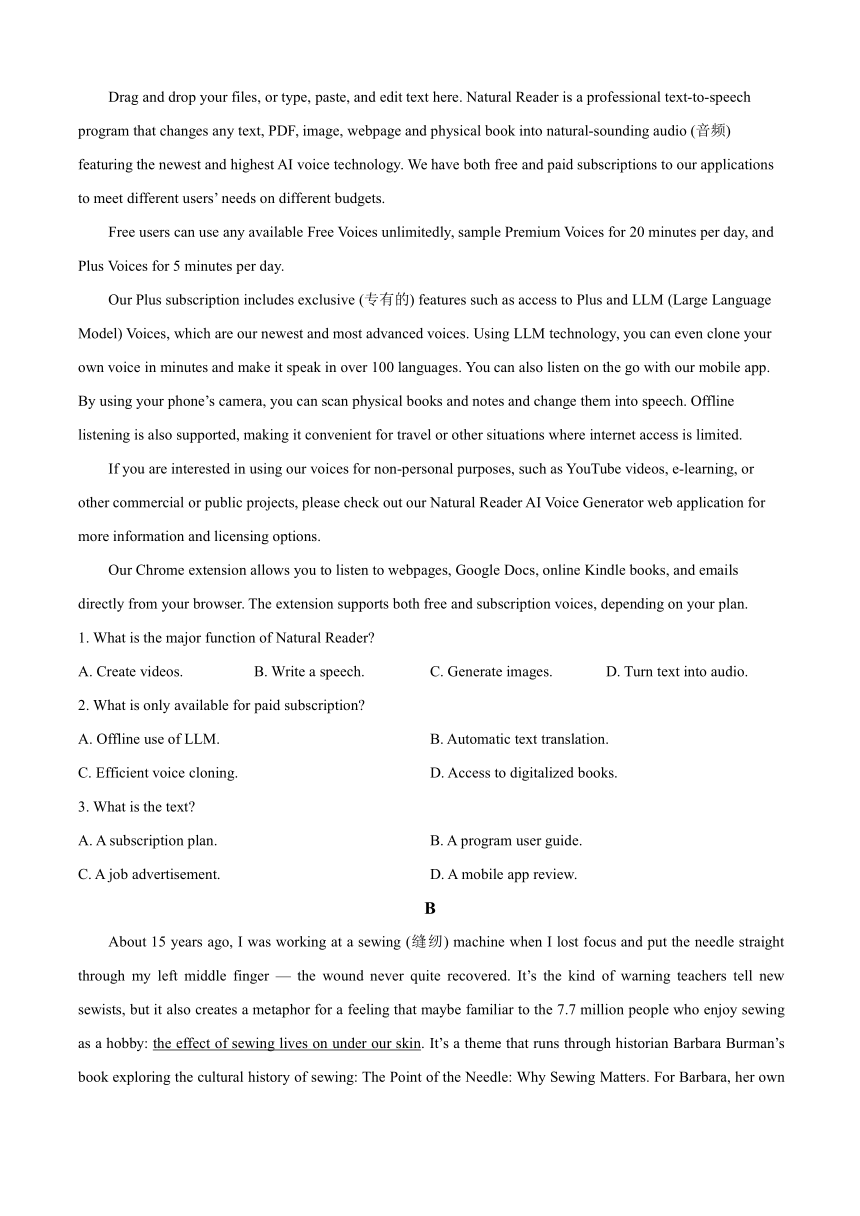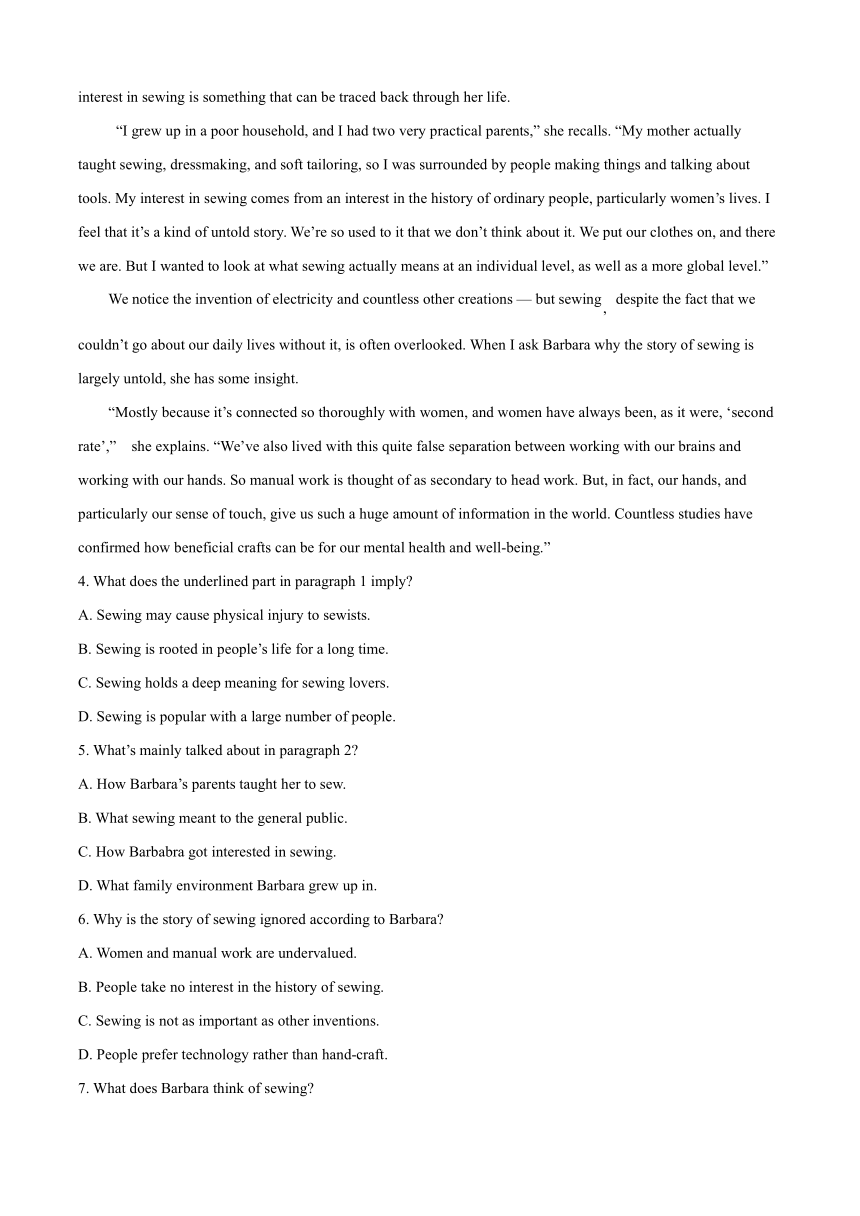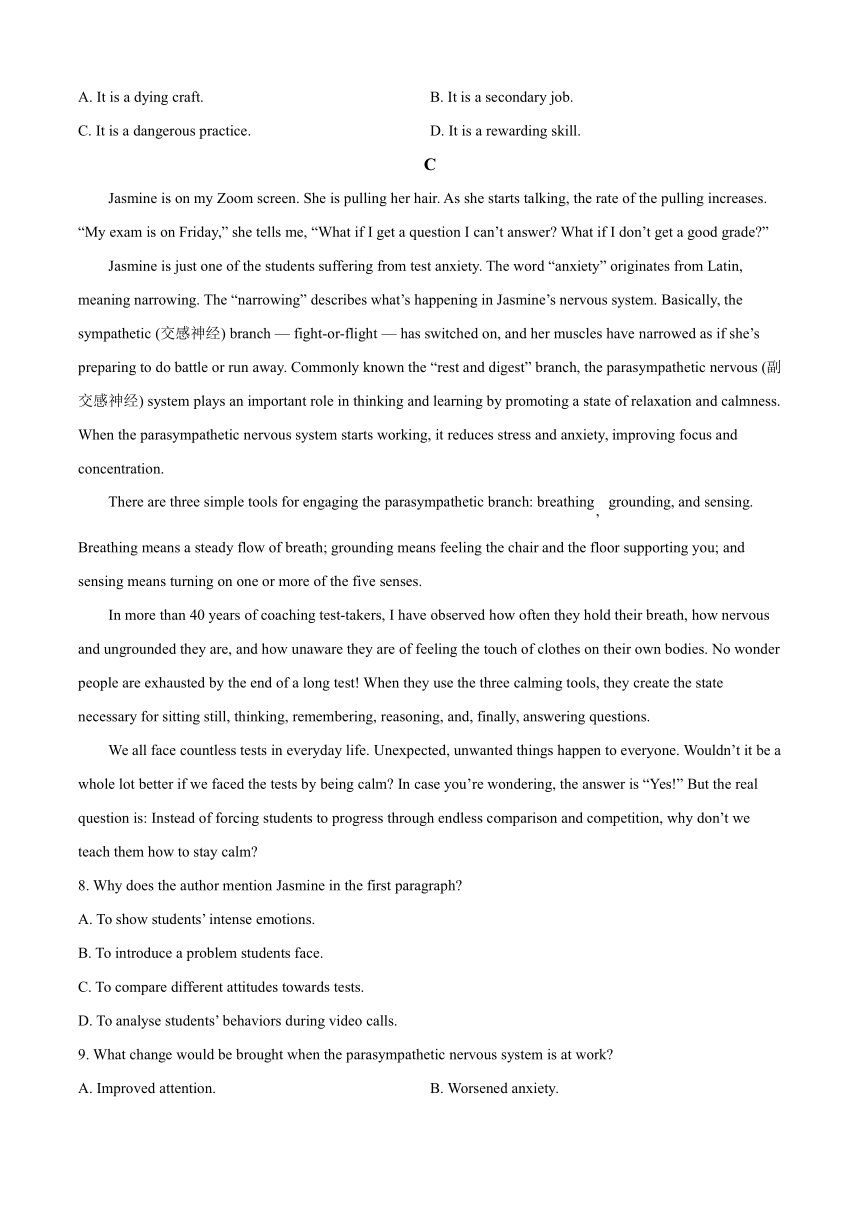 資源簡介
資源簡介
2025年6月濟南西城實驗中學(醫學中心校區)學情診斷測試
高一年級英語試題
本試卷共10頁。滿分150分。考試用時120分鐘。
注意事項:
1.答卷前,先將自己的姓名、準考證號填寫在試卷和答題紙上。
2.選擇題的作答:每小題選出答案后,用2B鉛筆把答題卡上對應題目的答案標號涂黑。如需改動,用橡皮擦干凈后,再選涂其他答案標號。
3.非選擇題的作答:用黑色簽字筆直接答在答題卡上對應的答題區域內。寫在試卷、草稿紙和答題卡上的非答題區域均無效。
第一節(共5小題;每小題1.5分,滿分7.5分)
聽下面5段對話。每段對話后有一個小題,從題中所給的A、B、C三個選項中選出最佳選項。聽完每段對話后,你都有10秒鐘的時間來回答有關小題和閱讀下一小題。每段對話僅讀一遍。
例:How much is the shirt
A. 19.15. B. 9.18. C. 9.15.
答案是C。
1. What are the speakers talking about
A. A recent injury. B. A football match. C. A weekend plan.
2. Where does the conversation probably take place
A. At a subway station. B. In an art classroom. C. In a department store.
3. Why is the woman going to the NGV
A. To purchase a painting. B. To pick up her nephew. C. To join in a family event.
4. What is the woman probably going to do next
A. Talk to the lecturer. B. Upload her recording. C. Catch up on the lecture.
5. How does the man feel now
A. Stressed. B. Satisfied. C. Disappointed.
第二節(共15小題;每小題1.5分,滿分22.5分)
聽下面5段對話或獨白。每段對話或獨白后有幾個小題,從題中所給的A、B、C三個選項中選出最佳選項。聽每段對話或獨白前,你將有時間閱讀各個小題,每小題5秒鐘;聽完后,各小題將給出5秒鐘的作答時間。每段對話或獨白讀兩遍。
聽第6段材料,回答第6、7題。
6. Why does the woman look so energetic
A. She got her favorite music.
B. She went for a morning run.
C. She played with new friends.
7. What does the man plan to do
A. Try jogging. B. Find a fitness coach. C. Download some music.
聽第7段材料,回答第8至10題。
8. What is discussed about the movie
A. The plot. B. The characters. C. The special effects.
9. What does the man say about the movie
A. Engaging. B. Moving. C. Educational.
10. What will the woman probably do this weekend
A. Visit the park. B. Watch the movie. C. Go to the restaurant.
聽第8段材料,回答第11至13題。
11. What did the man see on the street
A. A dog wearing a hat. B. A man walking a dog. C. A dog carrying a baseball.
12. What is the new coffee shop known for
A. Its special drink. B. Its unique location. C. Its dog-friendly setting.
13. What does the man plan to bring to the coffee shop
A. His hat. B. His camera. C. His dog.
聽第9段材料,回答第14至17題。
14. What is the company working on
A. Green energy. B. Urban planning. C. Digital innovation.
15. What is the man’s new job
A. A tech developer. B. A project manager. C. A marketing director.
16. What does the woman think of the man
A. Capable. B. Flexible. C. Humorous.
17. What is special about the new office building
A. It will be culture-rich. B. It will be eco-friendly. C. It will be artistic-looking
聽第10段材料,回答第18至20題。
18. What is the speaker
A. A zookeeper. B. A visitor. C. A guide.
19. How did the speaker describe the monkeys
A. Playful. B. Scary. C. Clever.
20. What does the speaker compare penguins to
A. Energetic kids. B. TikTok comedians. C. Clumsy ballet dancers.
第二部分 閱讀理解(共兩節,滿分50分)
第一節(共15小題;每小題2.5分,共37.5分)
A
Drag and drop your files, or type, paste, and edit text here. Natural Reader is a professional text-to-speech program that changes any text, PDF, image, webpage and physical book into natural-sounding audio (音頻) featuring the newest and highest AI voice technology. We have both free and paid subscriptions to our applications to meet different users’ needs on different budgets.
Free users can use any available Free Voices unlimitedly, sample Premium Voices for 20 minutes per day, and Plus Voices for 5 minutes per day.
Our Plus subscription includes exclusive (專有的) features such as access to Plus and LLM (Large Language Model) Voices, which are our newest and most advanced voices. Using LLM technology, you can even clone your own voice in minutes and make it speak in over 100 languages. You can also listen on the go with our mobile app. By using your phone’s camera, you can scan physical books and notes and change them into speech. Offline listening is also supported, making it convenient for travel or other situations where internet access is limited.
If you are interested in using our voices for non-personal purposes, such as YouTube videos, e-learning, or other commercial or public projects, please check out our Natural Reader AI Voice Generator web application for more information and licensing options.
Our Chrome extension allows you to listen to webpages, Google Docs, online Kindle books, and emails directly from your browser. The extension supports both free and subscription voices, depending on your plan.
1. What is the major function of Natural Reader
A. Create videos. B. Write a speech. C. Generate images. D. Turn text into audio.
2. What is only available for paid subscription
A. Offline use of LLM. B. Automatic text translation.
C. Efficient voice cloning. D. Access to digitalized books.
3. What is the text
A. A subscription plan. B. A program user guide.
C. A job advertisement. D. A mobile app review.
B
About 15 years ago, I was working at a sewing (縫紉) machine when I lost focus and put the needle straight through my left middle finger — the wound never quite recovered. It’s the kind of warning teachers tell new sewists, but it also creates a metaphor for a feeling that maybe familiar to the 7.7 million people who enjoy sewing as a hobby: the effect of sewing lives on under our skin. It’s a theme that runs through historian Barbara Burman’s book exploring the cultural history of sewing: The Point of the Needle: Why Sewing Matters. For Barbara, her own interest in sewing is something that can be traced back through her life.
“I grew up in a poor household, and I had two very practical parents,” she recalls. “My mother actually taught sewing, dressmaking, and soft tailoring, so I was surrounded by people making things and talking about tools. My interest in sewing comes from an interest in the history of ordinary people, particularly women’s lives. I feel that it’s a kind of untold story. We’re so used to it that we don’t think about it. We put our clothes on, and there we are. But I wanted to look at what sewing actually means at an individual level, as well as a more global level.”
We notice the invention of electricity and countless other creations — but sewing despite the fact that we couldn’t go about our daily lives without it, is often overlooked. When I ask Barbara why the story of sewing is largely untold, she has some insight.
“Mostly because it’s connected so thoroughly with women, and women have always been, as it were, ‘second rate’,” she explains. “We’ve also lived with this quite false separation between working with our brains and working with our hands. So manual work is thought of as secondary to head work. But, in fact, our hands, and particularly our sense of touch, give us such a huge amount of information in the world. Countless studies have confirmed how beneficial crafts can be for our mental health and well-being.”
4. What does the underlined part in paragraph 1 imply
A. Sewing may cause physical injury to sewists.
B. Sewing is rooted in people’s life for a long time.
C. Sewing holds a deep meaning for sewing lovers.
D. Sewing is popular with a large number of people.
5. What’s mainly talked about in paragraph 2
A. How Barbara’s parents taught her to sew.
B. What sewing meant to the general public.
C. How Barbabra got interested in sewing.
D. What family environment Barbara grew up in.
6. Why is the story of sewing ignored according to Barbara
A. Women and manual work are undervalued.
B. People take no interest in the history of sewing.
C. Sewing is not as important as other inventions.
D. People prefer technology rather than hand-craft.
7. What does Barbara think of sewing
A. It is a dying craft. B. It is a secondary job.
C. It is a dangerous practice. D. It is a rewarding skill.
C
Jasmine is on my Zoom screen. She is pulling her hair. As she starts talking, the rate of the pulling increases. “My exam is on Friday,” she tells me, “What if I get a question I can’t answer What if I don’t get a good grade ”
Jasmine is just one of the students suffering from test anxiety. The word “anxiety” originates from Latin, meaning narrowing. The “narrowing” describes what’s happening in Jasmine’s nervous system. Basically, the sympathetic (交感神經) branch — fight-or-flight — has switched on, and her muscles have narrowed as if she’s preparing to do battle or run away. Commonly known the “rest and digest” branch, the parasympathetic nervous (副交感神經) system plays an important role in thinking and learning by promoting a state of relaxation and calmness. When the parasympathetic nervous system starts working, it reduces stress and anxiety, improving focus and concentration.
There are three simple tools for engaging the parasympathetic branch: breathing grounding, and sensing. Breathing means a steady flow of breath; grounding means feeling the chair and the floor supporting you; and sensing means turning on one or more of the five senses.
In more than 40 years of coaching test-takers, I have observed how often they hold their breath, how nervous and ungrounded they are, and how unaware they are of feeling the touch of clothes on their own bodies. No wonder people are exhausted by the end of a long test! When they use the three calming tools, they create the state necessary for sitting still, thinking, remembering, reasoning, and, finally, answering questions.
We all face countless tests in everyday life. Unexpected, unwanted things happen to everyone. Wouldn’t it be a whole lot better if we faced the tests by being calm In case you’re wondering, the answer is “Yes!” But the real question is: Instead of forcing students to progress through endless comparison and competition, why don’t we teach them how to stay calm
8. Why does the author mention Jasmine in the first paragraph
A. To show students’ intense emotions.
B. To introduce a problem students face.
C. To compare different attitudes towards tests.
D. To analyse students’ behaviors during video calls.
9. What change would be brought when the parasympathetic nervous system is at work
A. Improved attention. B. Worsened anxiety.
C. Tightened muscles. D. Quickened response.
10. From the last paragraph we can infer that the writer thinks it important ________.
A. to take some tests to make progress
B. to attach importance to comparison and competition
C. to learn to avoid unexpected and unwanted things in life
D. to prepare students with the ways to keep calm during tests
11. What is the text mainly about
A. What do students face in tests B. How to deal with test anxiety
C. How to engage the nervous system D. What should students do to avoid tests
D
Scientists have revealed much of the basics about earthquakes: tectonic plates (構造板塊) move, causing strain energy (應變能) to build up, and that energy eventually releases in the form of an earthquake. However, forecasting earthquakes remains a significant challenge, which was evidenced by the 2011 great Tohoku earthquake. In addition to causing a tsunami that led to the Fukushima nuclear disaster, it resulted in more than 18,000 deaths.
In recent years, researchers have been trying to figure out a possible relation between the sun and earthquakes. Based on a previous study that connected solar activity with earthquakes, a study conducted by researchers from the University of Tsukuba (UT) cast light on this possibility, confirming that sunspot numbers had some influence on earthquakes and Earth’s climate, as affected by solar heat, played a role.
“Solar heat drives atmospheric temperature changes, which in turn can affect things like rock properties and underground water movement,” said Junqueira Saldanha, leader of the research team. “Such changes can make rocks tend to break apart. For example, the changes in rainfall and snowmelt can affect the pressure on tectonic plate boundaries. While these factors may not be the main drivers of earthquakes, they could still be playing a role that can help to predict earthquakes.”
Among other findings, the researchers used mathematical and computational methods to analyze earthquake data alongside solar activity records and surface temperatures on Earth. They observed that when they included Earth surface temperatures into their model, the forecasting became more accurate, especially for shallow earthquakes. “That makes sense, since heat and water mostly affect the upper layers of the Earth’s crust (地殼),” said Saldanha.
The findings suggest the transfer of solar heat to the surface of the Earth does affect earthquakes, however minutely, and that incorporating solar activity predictions into detailed Earth temperature models may help issue earthquake forecasts. “It’s an exciting direction, and we hope our study can decipher the bigger picture of what causes earthquakes,” said Saldanha.
12. Why did the author mention Tohoku earthquake in Paragraph 1
A. To demonstrate the movement of tectonic plates.
B. To illustrate the difficulty in earthquake forecast.
C. To reveal the heavy losses caused by earthquakes.
D. To stress the necessity of weakening strain energy.
13. What does the study by UT mainly focus on
A. The climate change caused by earthquakes.
B. The impact of solar activity on atmosphere.
C. The reasons for increased sunspot numbers.
D. The link between sunspots and earthquakes.
14 Which of the following would Saldanha agree
A. Solar heat decides earthquake frequency.
B. Tectonic plate pressure grows constantly.
C. Earthquakes occur in the crust’s upper layer.
D. Solar activity data helps predict earthquakes.
15. What does the underlined word “decipher” in the last paragraph mean
A. Reveal. B. Distinguish. C. Expand. D. Assess.
第二節(共5小題;每小題2.5分,滿分12.5分)
根據短文內容,從短文后的選項中選出能填入空白處的最佳選項,選項中有兩項為多余選項。
As a high school student, you’re likely used to learning through reading textbooks. ____16____ This lies at the heart of “experiential appreciation,” a philosophy that encourages you to interact directly with the world around you. It’s about learning from real-life experiences, and discovering a more profound and engaging way to learn.
To practice experiential appreciation, you can start by getting involved in hands-on activities related to your subjects. They will provide a firsthand understanding of the concepts you’re studying, making learning active and meaningful. So, try joining a sports team, picking up a paintbrush, or taking part in a local charity event. ____17____
As you dive deeper, immerse (沉浸) yourself fully in the surroundings and activities. When you’re in nature, don’t just look around. ____18____ Touching the leaves, feeling the wind and listening to the birds can enrich your learning and make each moment more memorable
____19____ After trying something new, ask yourself what you learned and how it made you feel. Write in a journal or discuss it with friends. This self-discovery turns experiences into life lessons and offers a deeper understanding of the world.
Experiential appreciation changes learning from a task to be completed into a journey to be treasured. ____20____ So, explore the world around you, let every experience shape you, and discover the endless possibilities that await. This is the core of true learning, where every moment is a step towards a richer, more enlightened life.
A. It extends learning beyond textbooks.
B. These activities bring learning to life.
C. Mind the impact of your actions on the environment.
D. Instead, activate your senses for a stronger tie with it
E. Take your experiences further by reflecting on them.
F. Textbooks offer a systematic introduction to essential concepts and principles.
G. Now consider expanding your learning from just reading to actively participating.
第三部分 語言運用(共兩節,滿分30分)
第一節 完形填空(共15小題;每題1分,滿分15分)
閱讀下面短文,從短文后各題所給的四個選項(A,B,C和D)中,選出可以填入空白處的最佳選項。
When my dad planned out a trip to La Mina Falls in the El Yunque National Rainforest, I was not really into it, and I went along ___21___.
I’ve never been fond of cold water. If the ___22___ isn’t to my liking, I’m not going to ___23___ myself from the pool’s edge like a missile (導彈). I’m the type of person who ___24___ their time easing into the water, lowering myself step-by-step, and ___25___ my body to get used to the icy depths.
My complicated relationship with water is ___26___ my dad, who I don’t think has ever looked ___27___ he dived. I wasn’t raised on the river like he was. Shortly after I was born, we ___28___ to central Florida, far away from the rapids of my father’s youth.
When we finally made it to the La Mina Falls, I was worn out. My dad was already knee-deep in the water and ___29___ fast, while I was resting on a rock. He paused, looking over at me and ____30____ perhaps for the first time, that I had ____31____ him into the forest. He waved his hand at me, and I ____32____ my shoes. I knew if I touched the water with my toe in the first place, I wouldn’t get in. So, I jumped into the ____33____ water, not completely without hesitation, where a ____34____ combination of accomplishment and regret washed over me.
When I broke the surface, I ____35____ my dad staring at me. “Your grandfather brought me here once when I was a kid.” His voice faded away into the water.
21. A. anxiously B. hesitantly C. curiously D. enthusiastically
22. A. time B. coach C. sport D. temperature
23. A. keep B. launch C. excuse D. rescue
24. A. measures B. saves C. takes D. kills
25. A. allowing B. controlling C. examining D. risking
26. A. in opposition to B. in response to C. at the mercy of D. on behalf of
27. A. once B. before C. because D. if
28. A. escaped B. journeyed C. relocated D. returned
29. A. floating B. withdrawing C. breathing D. sinking
30. A. realizing B. regretting C. admitting D. agreeing
31. A. challenged B. forced C. accompanied D. guided
32. A. stared at B. reached for C. kicked off D. dusted down
33. A. flooding B. appealing C. flowing D. freezing
34. A. confusing B. regular C. similar D. simple
35. A. left B. pictured C. stopped D. caught
第二節 語法填空(每小題1.5分,滿分15分)
A
閱讀下面材料,在空白處填入適當內容(1個單詞)或括號內單詞的正確形式。
Dr. Lin Qiaozhi, ___36___ (affect) by her mother’s death, chose to study medicine at 18 instead of following the traditional path of marriage. She graduated from PUMC with the Wehai Scholarship and became the first woman ___37___ (hire) as a resident physician. After studying abroad, she rejected offers to stay and returned home to serve women and children. During the war, she opened a private clinic, ___38___ (charge) very low fees and treating the poor. Known ___39___ the “mother of ten thousand babies,” she delivered over 50,000 babies and worked until her death, leaving her savings to a kindergarten and a fund for new doctors.
B
閱讀下面材料,在空白處填入適當的內容(1個單詞)或括號內單詞的正確形式。
Today was my first day back in San Francisco after camping in the Redwood Forest and visiting the wine country of Napa Valley. It feels great to be back in the city—a city that rebuilt ___40___ (it) after the 1906 earthquake. My hotel is near downtown, in the Mission District, ___41___ an art movement called the “Mission School” started. It was influenced by graffiti art and comic art. I spent hours enjoying lively street art and ate ___42___ (taste) Mexican-Chinese noodles from a food truck. In the afternoon, I visited a local museum showing how immigrants built America. This evening, I had great food at a Cantonese restaurant in Chinatown.
C
閱讀下面材料,在空白處填入適當的內容(1個單詞)或括號內單詞的正確形式。
Since the earliest times, man has dreamed of exploring the universe, but before the mid-20th century, it was considered ____43____ impossible dream. However, with the efforts of scientists, rockets that could escape Earth’s gravity ____44____ (make). Scientists tried to ensure the safety of the astronauts, but disasters still happened. People still believe in the importance of carrying on space ____45____ (explore).
第四部分 寫作(共兩節,滿分40分)
第一節:單詞拼寫(本大題共10小題,共15.0分)
46. It is no use ________(爭論) with him about the question for he won’t change his mind. (根據漢語提示單詞拼寫)
47. I’m d___________ in you—I really thought I could trust you! (根據首字母單詞拼寫)
48. She f______ the letter in half and put it into her pocket.(根據首字母單詞拼寫)
49. There are many kinds of r___________ like coal, oil, and copper. (根據首字母單詞拼寫)
50. Though ________ (缺少) money, his parents managed to send him to university. (根據漢語提示單詞拼寫)
51. ______ (祝賀) on the Spring Festival! Wishing you happiness and good fortune in the new year. (根據漢語提示單詞拼寫)
52. He _______(猶豫) and asked me if he could sit near me. (根據漢語提示單詞拼寫)
53. She tore up the letter in ______ (絕望), unable to bear the pain it brought. (根據漢語提示單詞拼寫)
54. The festival showcases the d______ traditions, music, and cuisine of different ethnic communities. (根據首字母單詞拼寫)
55. I don’t know when the fire o___________, but it’s reported that it has been put out. (根據首字母單詞拼寫)
第二節:讀后續寫(本大題共1小題,共25.0分)
56. 閱讀下面材料,根據其內容和所給段落開頭語續寫兩段,使之構成一篇完整的短文。
The car turned onto the familiar road that led to Grandma’s farm. “Jude, this summer holiday will be a great chance for you to stay with your grandma,” Dad said as he drove. Every moment, we were moving farther away from the city, the place where I knew how to do things right.
The car engine wasn’t off before Grandma hugged me. I slowly dragged myself out of the car. “Jude, you look unhappy. Why ” Grandma asked. She acted like nothing bad had happened last time. Could I ask how much money her neighbor Mr. Jackson had lost because of my mistake Was he still upset with me “I’m fine,” I answered. “I’m just missing my computer puters are something I’m good at.” “That sounds disappointing.” Grandma nodded.
I liked visiting the farm during breaks before I messed things up last summer. Grandma lived alone, and Mr. Jackson was like family to her. Then one day I forgot to lock the gate and let the goats into his flower beds. He lost almost all his roses for the farmers’ market.
Now, back at the farm, I felt nervous. I was trying to hide in the room when I saw Mr. Jackson! He was opening the door and calling Grandma. “I need help!” he yelled to her. “Just a second for the freshly harvested roses!” That was when he saw me. I felt my heart tighten and was ready for his criticism. I deserved it. He had probably been waiting for this moment since last summer.
However, Mr. Jackson greeted me happily, “Great, Jude is here! Your grandma always tells us you are a wonderfully competent(有能力的)computer programmer.” I shook my head. “I am not competent. I am sorry I messed things up.” He was surprised and comforted me, “It was an accident. Being competent doesn’t mean you never make mistakes.”
I looked out of the window. There were piles of roses waiting to be sold. “Jude, can you help us We want to sell roses online. We have a computer and all the parts(零件)for our internet connection, but we just can’t set it up,” Grandma asked. No internet. They seemed to live in the twentieth century.
注意:
1. 續寫詞數應為150左右;
2. 請按如下格式在答題卡的相應位置作答。
Maybe I could be someone who was really competent.
____________________________________________________________________________________________________________________________________________________________________________________________________________________________________________________________________________________________________________________________________________________________________________________________________________________________________________________________________________
Within a few hours, orders for roses flooded in.
____________________________________________________________________________________________________________________________________________________________________________________________________________________________________________________________________________________________________________________________________________________________________________________________________________________________________________________________________________
2025年6月濟南西城實驗中學(醫學中心校區)學情診斷測試
高一年級英語試題
本試卷共10頁。滿分150分。考試用時120分鐘。
注意事項:
1.答卷前,先將自己的姓名、準考證號填寫在試卷和答題紙上。
2.選擇題的作答:每小題選出答案后,用2B鉛筆把答題卡上對應題目的答案標號涂黑。如需改動,用橡皮擦干凈后,再選涂其他答案標號。
3.非選擇題的作答:用黑色簽字筆直接答在答題卡上對應的答題區域內。寫在試卷、草稿紙和答題卡上的非答題區域均無效。
第一節(共5小題;每小題1.5分,滿分7.5分)
聽下面5段對話。每段對話后有一個小題,從題中所給的A、B、C三個選項中選出最佳選項。聽完每段對話后,你都有10秒鐘的時間來回答有關小題和閱讀下一小題。每段對話僅讀一遍。
例:How much is the shirt
A. 19.15. B. 9.18. C. 9.15.
答案是C。
1. What are the speakers talking about
A. A recent injury. B. A football match. C. A weekend plan.
2. Where does the conversation probably take place
A. At a subway station. B. In an art classroom. C. In a department store.
3. Why is the woman going to the NGV
A. To purchase a painting. B. To pick up her nephew. C. To join in a family event.
4. What is the woman probably going to do next
A. Talk to the lecturer. B. Upload her recording. C. Catch up on the lecture.
5. How does the man feel now
A. Stressed. B. Satisfied. C. Disappointed.
第二節(共15小題;每小題1.5分,滿分22.5分)
聽下面5段對話或獨白。每段對話或獨白后有幾個小題,從題中所給的A、B、C三個選項中選出最佳選項。聽每段對話或獨白前,你將有時間閱讀各個小題,每小題5秒鐘;聽完后,各小題將給出5秒鐘的作答時間。每段對話或獨白讀兩遍。
聽第6段材料,回答第6、7題。
6. Why does the woman look so energetic
A. She got her favorite music.
B. She went for a morning run.
C. She played with new friends.
7. What does the man plan to do
A. Try jogging. B. Find a fitness coach. C. Download some music.
聽第7段材料,回答第8至10題。
8. What is discussed about the movie
A. The plot. B. The characters. C. The special effects.
9. What does the man say about the movie
A. Engaging. B. Moving. C. Educational.
10. What will the woman probably do this weekend
A. Visit the park. B. Watch the movie. C. Go to the restaurant.
聽第8段材料,回答第11至13題。
11. What did the man see on the street
A. A dog wearing a hat. B. A man walking a dog. C. A dog carrying a baseball.
12. What is the new coffee shop known for
A. Its special drink. B. Its unique location. C. Its dog-friendly setting.
13. What does the man plan to bring to the coffee shop
A. His hat. B. His camera. C. His dog.
聽第9段材料,回答第14至17題。
14. What is the company working on
A. Green energy. B. Urban planning. C. Digital innovation.
15. What is the man’s new job
A. A tech developer. B. A project manager. C. A marketing director.
16. What does the woman think of the man
A. Capable. B. Flexible. C. Humorous.
17. What is special about the new office building
A. It will be culture-rich. B. It will be eco-friendly. C. It will be artistic-looking
聽第10段材料,回答第18至20題。
18. What is the speaker
A. A zookeeper. B. A visitor. C. A guide.
19. How did the speaker describe the monkeys
A. Playful. B. Scary. C. Clever.
20. What does the speaker compare penguins to
A. Energetic kids. B. TikTok comedians. C. Clumsy ballet dancers.
第二部分 閱讀理解(共兩節,滿分50分)
第一節(共15小題;每小題2.5分,共37.5分)
A
【1~3題答案】
【答案】1. D 2. C 3. B
B
【4~7題答案】
【答案】4. C 5. C 6. A 7. D
C
【8~11題答案】
【答案】8. B 9. A 10. D 11. B
D
【12~15題答案】
【答案】12. B 13. D 14. D 15. A
第二節(共5小題;每小題2.5分,滿分12.5分)
根據短文內容,從短文后的選項中選出能填入空白處的最佳選項,選項中有兩項為多余選項。
【16~20題答案】
【答案】16. G 17. B 18. D 19. E 20. A
第三部分 語言運用(共兩節,滿分30分)
第一節 完形填空(共15小題;每題1分,滿分15分)
閱讀下面短文,從短文后各題所給的四個選項(A,B,C和D)中,選出可以填入空白處的最佳選項。
【21~35題答案】
【答案】21. B 22. D 23. B 24. C 25. A 26. A 27. B 28. C 29. D 30. A 31. C 32. C 33. D 34. A 35. D
第二節 語法填空(每小題1.5分,滿分15分)
A
【36~39題答案】
【答案】36. affected
37. to be hired
38 charging
39. as
B
【40~42題答案】
【答案】40. itself
41. where 42. tasty
C
【43~45題答案】
【答案】43. an 44. were made
45. exploration
第四部分 寫作(共兩節,滿分40分)
第一節:單詞拼寫(本大題共10小題,共15.0分)
【46題答案】
【答案】arguing
【47題答案】
【答案】disappointed## isappointed
【48題答案】
【答案】folded##olded
【49題答案】
【答案】resources##esources
【50題答案】
【答案】lacking
【51題答案】
【答案】Congratulations
【52題答案】
【答案】hesitated
【53題答案】
【答案】despair
【54題答案】
【答案】diverse##iverse
【55題答案】
【答案】occurred##curred
第二節:讀后續寫(本大題共1小題,共25.0分)
【56題答案】
【答案】 I could be someone who was really competent. “I can definitely help with that! Where are the parts ” Following Grandma, I went into the room, where a computer sat surrounded by some scattered parts. Rolling up my sleeves, I carefully connected everything. It was a piece of cake to me. “Done!” I announced confidently. After a few adjustments, the internet was up and running. Now it was time to sell the roses. I decided to start from my social media platform. I quickly uploaded photos, added descriptions, and set prices. Before long, notifications started showing up — people were noticing. My abilities made a difference!(96詞)
Within a few hours, orders for roses flooded in. “This is amazing, Jude!” Grandma cheered with joy as she began bustling about, packing flowers. Mr. Jackson chuckled warmly as he handed me another bunch to label. The energy was electric — everyone was on their feet, moving quickly to keep up with the growing orders. The farm felt alive, and so did I. To our surprise, the roses sold out in just half a day. “You’ve brought the farm into the twenty-first century, Jude,” Grandma hugged me tightly. I realized that being competent wasn’t about avoiding mistakes. It was about facing them head-on and making the most of my strengths.(100詞)
展開更多......
收起↑
 資源預覽
資源預覽
